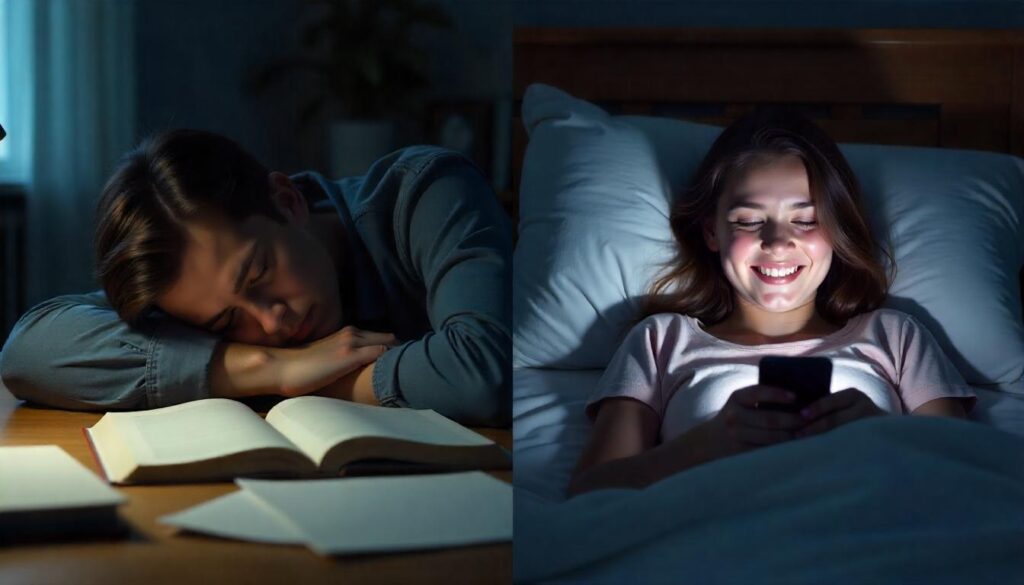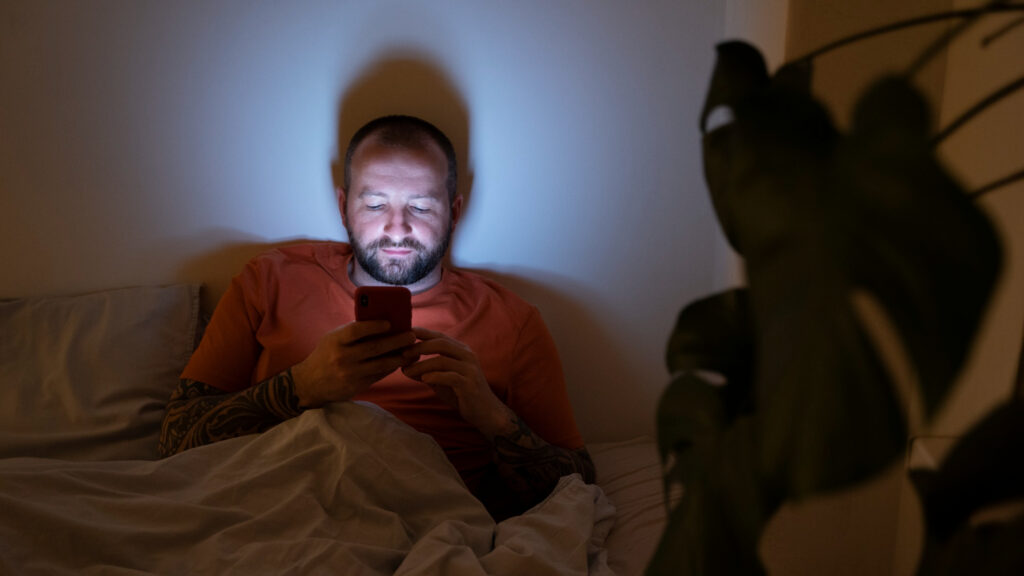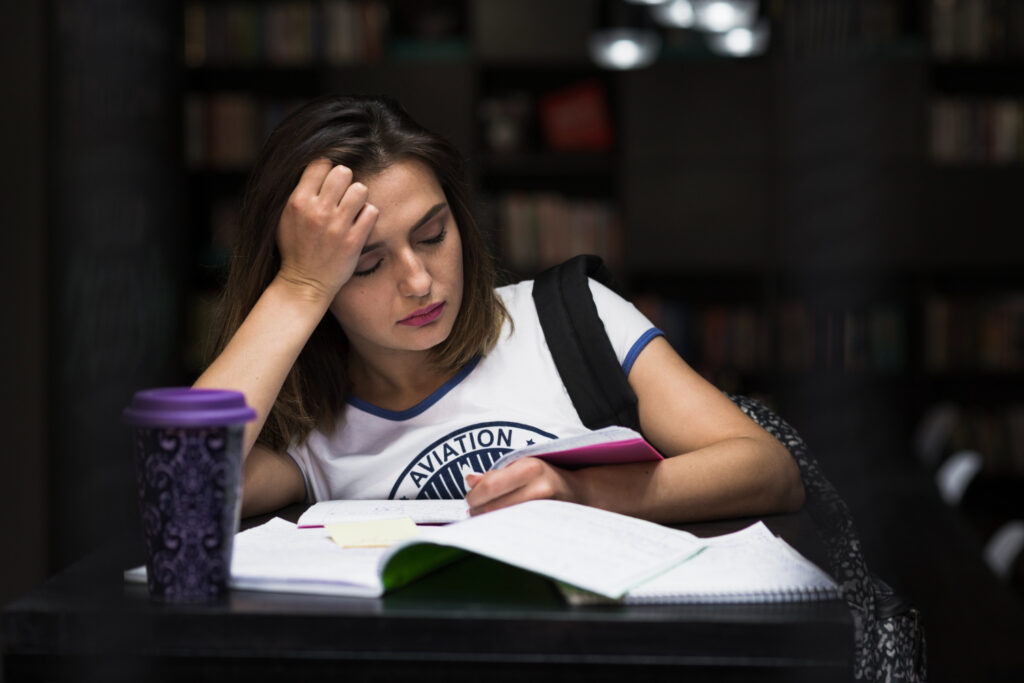Introduction: “You Open a Book, Sleep Opens Its Arms”

Stop me if this sounds familiar:
You finally sit down to study. You’re ready, books open, pen in hand… and BAM — your eyes get heavy.
But scroll Insta at 2 AM? You’re wide awake like it’s a party.
Sound like you? You’re not lazy. Your brain is reacting exactly how it’s wired to.
In this blog, you’ll learn:
- Why you feel sleepy when studying but not while on phone
- Real, science-backed reasons (dopamine, environment, habits)
- Practical ways to stay awake while studying
- Smart study hacks used by toppers
- FAQs that clear all your doubts
Let’s fix this together.
Why You Don’t Feel Sleepy on Phone (Even at 3 AM)

Let’s be real – reels, games, anime = no yawns. But why?
1. Your Brain Is Addicted to Dopamine
Every scroll, like, and funny reel gives your brain a dopamine hit – the “feel good” chemical.
Harvard Health: “Digital platforms are designed to hijack your brain’s reward system. Dopamine keeps you coming back for more.”
Phones = fast rewards → brain stays alert.
2. Low Mental Effort, High Enjoyment
Watching reels or gaming requires zero effort. Your brain’s just chilling – not solving maths or memorising history dates.
No stress = no sleepiness.
3. Sensory Overload = Wide Awake
Bright lights, sound effects, motion — your phone is a full sensory package.
This keeps your brain hyper-stimulated, unlike the slow, quiet vibe of studying.
Why You Feel Sleepy While Studying

Okay, now flip the scene. You sit down to study and suddenly… yawn attack. Here’s why.
1. Studying Feels Like Work (Low Dopamine)
Okay, now flip the scene. You sit down to study and suddenly… yawn attack. Here’s why.
No instant reward. No likes. Just hard work.
So dopamine levels drop → brain feels sleepy.
Cleveland Clinic explains: Mental effort without stimulation can tire the brain faster, especially when reading dense content.
2. Passive Learning = Bored Brain
Reading without interaction = brain gets bored.
If you’re just highlighting or staring at notes, your brain zones out.
Sleep Foundation says: “Monotonous tasks in a still position can activate sleep pathways.”
3. Your Study Setup Triggers Sleep
You study:
- On the bed (sleep zone)
- In dim light
- After a heavy meal
This combo tells your brain: “It’s nap time.”
4. Messed-Up Sleep Cycle (Thanks, Phone)
If you sleep at 2 AM and wake at 7 AM, your brain is in zombie mode.
Tired brain = less focus = more sleepiness when you try to study.
CDC recommends 8 hours of sleep for teens and young adults for peak performance.
How to Stay Awake While Studying – Real Fixes That Work

Let’s get to solutions. No motivation quotes – just smart, practical hacks.
✅ Switch to Active Learning
Ditch the boring “just read” method.
Do this instead:
Write short notes in your own words
Teach it to yourself (Feynman Technique)
Use flashcards (apps like Anki)
Quiz yourself after each topic
More engagement = less sleep.
✅ Use Pomodoro Technique (Study in Sprints)
Don’t marathon study. Instead:
-
Study 25 mins ⏱️
-
Take 5-min break 🍎
-
Repeat 4 times → then take a 20-30 min longer break
Try Pomofocus.io – a free timer that follows Pomodoro method.
It works because it keeps your brain alert in short bursts.
✅ Fix Your Study Setup
Your environment matters more than you think.
Do this:
Study on a chair + table, not bed
Use white, bright light 💡
Keep a water bottle and dry snack (like nuts) nearby
Avoid studying immediately after meals
Bonus: Study near a window or with background instrumental music (lofi beats).
✅ Try the “Rubber Band Trick” (not recommended)
Wear a rubber band on your wrist.
If you feel yourself dozing, gently snap it.
It gives a mini shock → resets your focus.
Weird but works.
✅ Get Your Sleep Back on Track
Even the best hacks won’t work if you’re sleep-deprived.
Sleep tips:
Sleep 7-8 hours daily
No screens 30 mins before bed
Try sleeping + waking at the same time every day
Sleep improves memory and focus – it’s not optional, it’s a weapon.
Bonus: How Toppers Stay Awake & Focused
Here’s what smart students actually do:
Break long sessions into Pomodoro-style sprints
Switch subjects every 1-2 hours (keeps brain fresh)
Study when their brain is sharpest (early morning or late night)
Avoid distractions – phone stays outside the room
Treat study like gym: not always fun, but necessary and results-driven
FAQs – Sleep While Studying
Phones give instant dopamine. Studying needs effort and gives delayed reward. Plus, study setups often mimic sleep conditions (bed, dim lights).
Use active learning, sit at a desk, use Pomodoro, drink water, and fix your sleep schedule.
Yes, but don’t overdo it. 1 cup is fine. Also drink water and try natural focus boosters like peppermint gum or short walks.
Totally normal, especially if it’s passive reading or you’re tired. Use flashcards, summarising, or explain the topic aloud to stay alert.
Final Words: It’s Not You – It’s Your Method
Feeling sleepy while studying doesn’t mean you’re weak, dumb, or lazy.
Your brain is just doing its job – conserving energy when bored or overstimulated.
But now you have the science… and the solutions.
So start small:
Fix your study zone
Add active techniques
Sleep better
And if you doze off… forgive yourself and try again
Want a Custom “Smart Study Plan”?
Drop a comment or DM if you want a FREE custom study plan (NEET, UPSC, CBSE, SSC – I got your back).
Share this with a friend who naps more with their book than their pillow 😴
